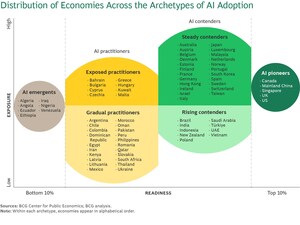Now That Digital Transformation Is Commonplace, People Want Companies to Intensify Their Efforts, Involve Them in the Process, and Increase Training and Support
A Global BCG Survey Shows That Both Managers and Employees Believe Digital Transformation Has Helped During the COVID-19 Crisis, but They See Room for Improvement, Particularly in Learning and Hiring
PARIS, July 3, 2020 /PRNewswire/ -- Digital transformation has widespread support among managers and employees, but some think that the pace of change at their companies could be faster, they could be more involved than they are, and they are unsure of how it will affect their jobs or pay, according to a global survey commissioned by Boston Consulting Group (BCG).
People at all levels believe that the transformation to digital technologies and methods has helped their organizations weather the effects of the coronavirus pandemic and will aid recovery efforts, according to the survey of 5,250 people working at companies in China, France, Germany, the UK, and the US.
Despite the generally positive attitudes, much work remains to be done in order for managers and employees to feel comfortable with changes tied to the digital transformation. And although most people approve of new ways of working, companies have not fully adopted them, according to the survey.
It's clear from the results that organizations are making progress. To accelerate the transition, they must eliminate impediments by involving more people and providing them with coaching and support so that they understand and feel engaged in the process. "It's especially important to include front-line workers so that they understand how what they do fits into the big picture," said Vanessa Lyon, a BCG managing director and partner. "That could lead to better buy-in for new practices."
Responding to the COVID-19 Crisis
Workers overwhelmingly approve of how their companies have applied digital transformation to combat the COVID-19 crisis. Worldwide, more than eight of ten managers (89%) and employees (84%) believe digital is helping their companies get through the economic slowdown that the pandemic created. The vast majority also believe it will continue to provide support and safeguard jobs as organizations relaunch or restructure business operations.
The majority of people feel that their companies should increase investments in technologies that would help them respond to the crisis. More than three-quarters of managers (83%) and employees (77%) favor boosting spending on technology for remote work and remote meetings, according to the survey. And more than 70% of both managers and employees endorse increased budgets for technologies that support client relationships, including applications for managing information requests and providing after-sale services.
Willing to Help Build the Future
Globally, 78% of managers and 57% of employees say their organizations are engaged in digital transformation, and the vast majority are willing to be part of the process. Among managers, 86% say that they are willing for a transformation to happen, and the numbers are even higher in China (91%) and the US (90%). Among employees, 76% support their organization's digital transformation.
People's enthusiasm for transformation may influence their expectations and perceptions of their organization's approach to change. At companies that have transformation projects underway, 37% of managers and 35% of employees feel their organization's efforts lag behind those of their competitors. The dissatisfaction is more pronounced at companies that have yet to start a transformation: in those organizations, 40% of managers and 41% of employees feel their employers' efforts trail those of rival enterprises.
Companies could speed up the evolution by providing more training and upskilling, which is needed to help people pick up the capabilities that they need to work in new roles or in different ways. That could describe, for instance, automotive engineers who need to learn software development in order to work on autonomous-vehicle technology, or research and development specialists who must understand data science in order to develop future scenarios, according to Lyon.
But both managers and employees rank training and upskilling as the least successful elements of digital transformation, along with hiring people who have the appropriate skills. "To help people adopt new skills, organizations should look for ways they can incorporate new capabilities into the work they do every day," said Debbie Lovich, a BCG managing director and partner. "Not only that, organizations must create a corporate culture where people learn how to learn so that they can continue to adapt."
More Digital Transformation Trends
Other elements of digital transformations included in the survey:
- Although 89% of managers are involved in digital transformations—including more than half who make decisions about transformation projects—only 65% of employees say they participate in one or more digitization activities in their department or unit.
- The lack of adequate training for employees on new ways of working tied to digital transformations is clear from the gap between managers who say they would use agile methods (82%) and employees who say the same (66%).
- Among employees in the countries included in the survey, workers in China have the most forward-looking approach to digital transformation. Virtually all Chinese managers (99%) report being involved in digital transformation projects, along with 87% of employees. Only 19% of Chinese managers feel their companies are behind the competition when it comes to digital transformation, compared with the multicountry average of 35%.
To arrange an interview with one of the authors, please contact Eric Gregoire at +1 617 850 3783 or [email protected].
About Boston Consulting Group
Boston Consulting Group partners with leaders in business and society to tackle their most important challenges and capture their greatest opportunities. BCG was the pioneer in business strategy when it was founded in 1963. Today, we help clients with total transformation—inspiring complex change, enabling organizations to grow, building competitive advantage, and driving bottom-line impact.
To succeed, organizations must blend digital and human capabilities. Our diverse, global teams bring deep industry and functional expertise and a range of perspectives to spark change. BCG delivers solutions through leading-edge management consulting along with technology and design, corporate and digital ventures—and business purpose. We work in a uniquely collaborative model across the firm and throughout all levels of the client organization, generating results that allow our clients to thrive.
SOURCE Boston Consulting Group (BCG)

Related Links
WANT YOUR COMPANY'S NEWS FEATURED ON PRNEWSWIRE.COM?
Newsrooms &
Influencers
Digital Media
Outlets
Journalists
Opted In




Share this article